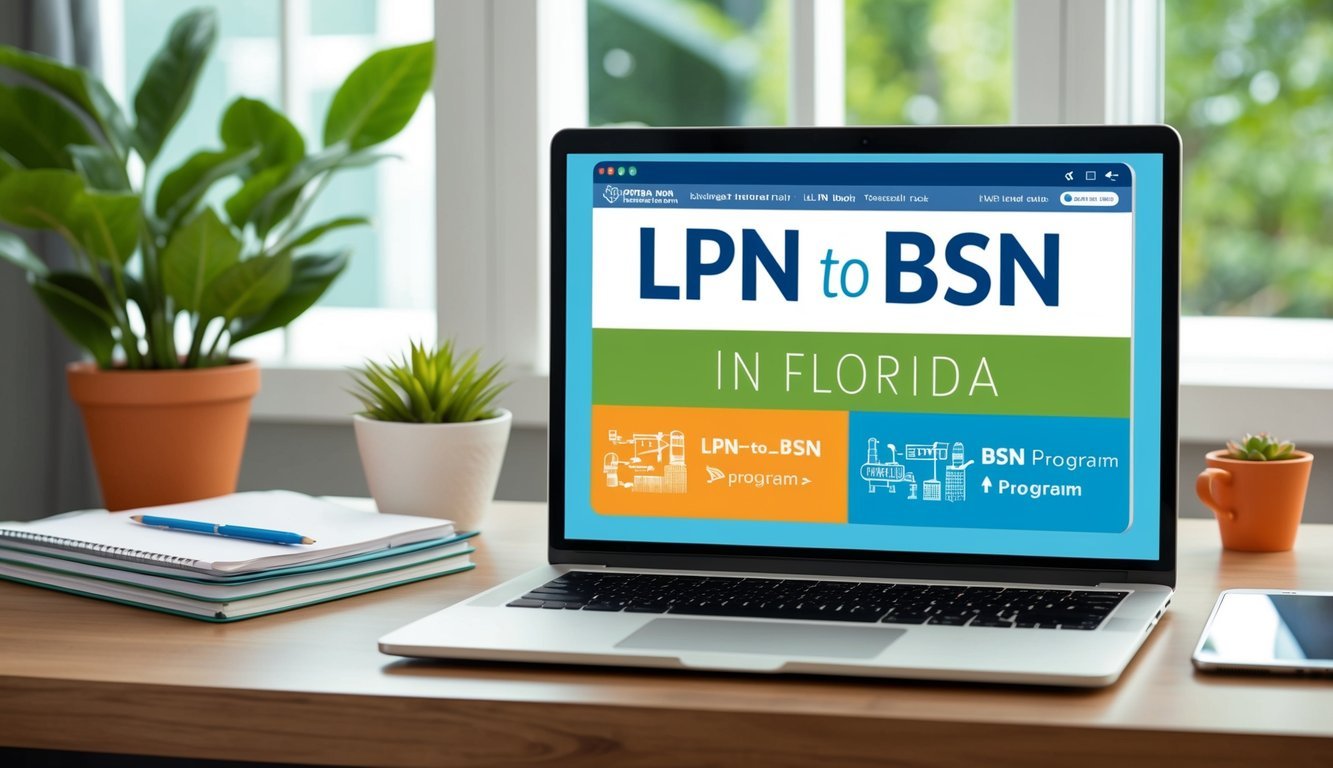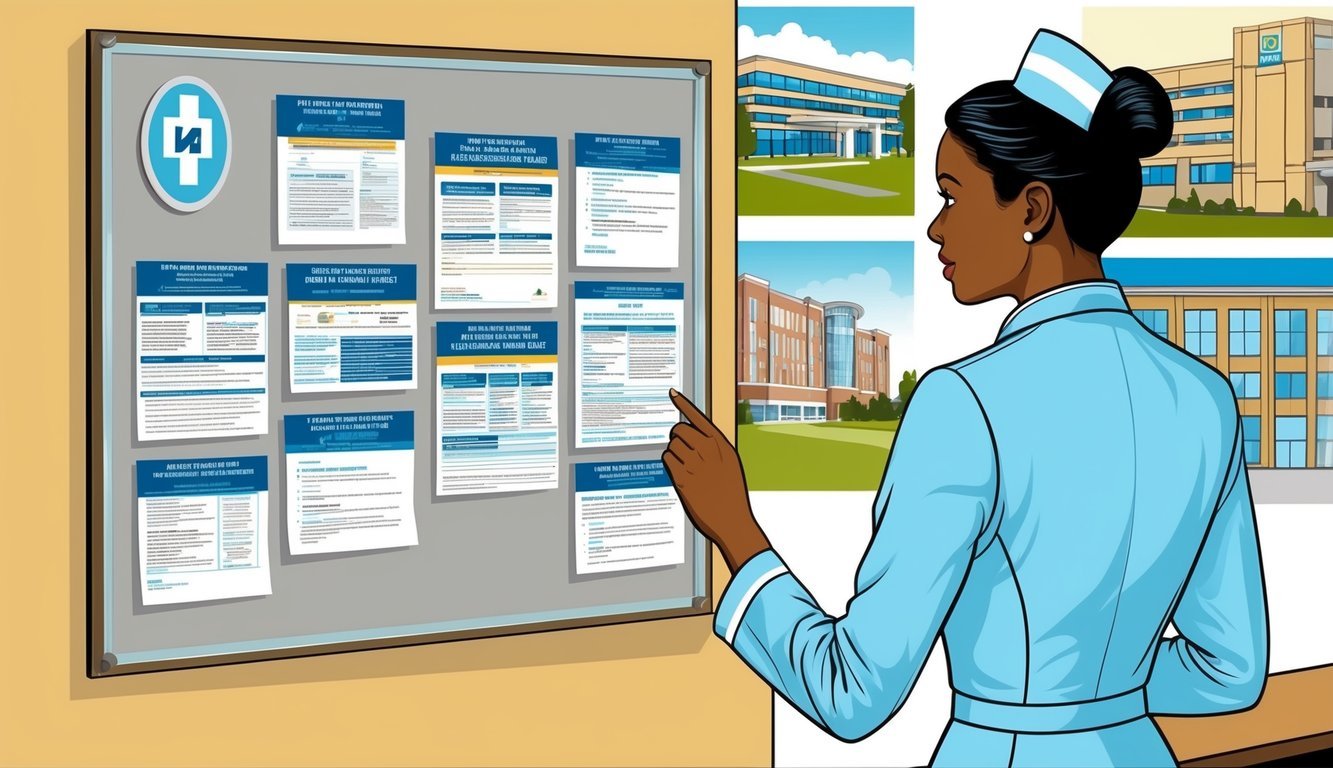LPN to BSN programs in Florida offer a valuable path for Licensed Practical Nurses looking to expand their careers. These programs provide the education and training needed to become a Registered Nurse, opening doors to higher salaries and more job opportunities.
With a blend of classroom instruction and hands-on clinical experience, you can develop the skills necessary to succeed in a complex healthcare environment.
Many schools in Florida offer both campus-based and online options to fit your lifestyle.
This flexibility makes it easier for you to balance your education with work and family responsibilities.
Additionally, financial aid options are often available, ensuring that you can pursue your goals without overwhelming debt.
Exploring these programs can set you on a rewarding career path while enhancing your nursing knowledge and skills.
The journey from LPN to BSN can lead to exciting career advancements and opportunities in diverse healthcare settings.
Key Takeaways
- LPN to BSN programs enhance nursing education and skills.
- Flexible learning options are available to accommodate busy schedules.
- Advancing to a BSN opens doors to better job opportunities and higher salaries.
Understanding LPN to BSN Programs in Florida

LPN to BSN programs provide a pathway for licensed practical nurses to advance their careers and become registered nurses.
These programs often offer flexible learning options and are designed to help you meet the requirements for RN licensure.
Pathways for LPNs to Become Registered Nurses
LPNs in Florida have various pathways to transition to registered nurses.
Many programs allow you to build on your existing knowledge and experience.
You can pursue an online or campus-based Bachelor of Science in Nursing (BSN) program.
Some universities offer accelerated options, which can expedite your journey.
Typically, these programs focus on key nursing concepts, clinical skills, and patient care.
Most programs require you to complete general education courses alongside nursing courses.
This approach helps provide a comprehensive educational background, preparing you for the NCLEX-RN exam.
Bachelor of Science in Nursing (BSN): An Overview
The Bachelor of Science in Nursing (BSN) is a four-year degree that offers broad education in nursing.
It covers theory, clinical practice, and leadership skills.
BSN programs often emphasize critical thinking, communication, and patient-centered care.
Having a BSN provides several advantages, such as:
- Enhanced job opportunities: Many healthcare facilities prefer or require a BSN for nursing positions.
- Higher salary potential: RNs with a BSN generally earn higher salaries than those with an associate degree.
- Career advancement: A BSN can open doors to management and specialty roles.
In Florida, programs are designed specifically for LPNs to advance efficiently and gain the necessary knowledge for licensure.
Accreditation and Approval by Florida Board of Nursing
Accreditation is crucial when selecting an LPN to BSN program.
Proper accreditation ensures the program meets high educational standards.
Programs should be accredited by recognized bodies, such as the Commission on Collegiate Nursing Education (CCNE) or the Accreditation Commission for Education in Nursing (ACEN).
In Florida, the Florida Board of Nursing oversees nursing education programs.
They approve programs to ensure they meet state requirements for licensure.
Before enrolling, check that the program is both accredited and Florida Board-approved.
This step is vital for your future career as an RN and will help ensure your education is valuable and respected.
You can find a list of approved programs on the Florida Board of Nursing website.
Curriculum and Clinical Experience Requirements

In LPN to BSN programs, you will encounter a structured curriculum designed to prepare you for advanced nursing roles.
The program includes essential nursing courses paired with hands-on clinical experience to enhance your skills and knowledge in various healthcare settings.
Key Nursing Courses and Topics
You will study a mix of foundational and advanced nursing subjects.
Key courses often include:
- Nursing Theory: Understanding theoretical frameworks that guide clinical practice.
- Pharmacology: Learning about medications and their effects, which is crucial for patient safety.
- Pathophysiology: Studying disease processes to inform treatment plans.
- Mental Health Nursing: Focusing on the psychological aspects of patient care.
- Nutrition: Emphasizing the role of diet in health and recovery.
Each of these courses builds upon your existing knowledge as an LPN, preparing you for more complex patient care challenges.
You will also engage in nursing research, which helps in the application of evidence-based practice in your future career.
Clinical Practicum in Healthcare Settings
Clinical experience is a vital part of your training.
You will complete a clinical practicum in various healthcare settings, such as:
- Hospitals
- Clinics
- Long-term care facilities
During these rotations, you will apply your knowledge in real-world situations.
Under the supervision of experienced mentors, you will improve your hands-on skills in areas like patient assessment, care planning, and implementation.
These practicums ensure you understand nursing practice in diverse environments.
The collaboration with healthcare professionals further sharpens your clinical competencies, making you well-prepared for the responsibilities ahead.
You can learn more about clinical requirements at the Florida Board of Nursing.
Admission, Progression, and Graduation Standards

Navigating the admission process for LPN to BSN programs in Florida requires attention to specific standards.
Understanding the requirements and what is needed for academic and clinical competencies is essential for a smooth transition from LPN to BSN.
Admission Requirements for LPN to BSN Programs
To gain admission to LPN to BSN programs, you must meet several criteria.
Common requirements include:
- Accredited LPN/LVN Program Graduation: You need to have completed an accredited LPN program.
- Active Nursing License: Hold an unencumbered LPN license in the state where you plan to study.
- GPA Requirement: Many programs require a minimum GPA, often around 2.5 on a 4.0 scale.
- Entrance Exam: Some schools may ask for scores from the Test of Essential Academic Skills (TEAS) to assess your readiness.
Each program may have unique prerequisites, so check specific admissions criteria.
For example, Florida Atlantic University has specific requirements for their RN-BSN tracks, which you can find here.
Assessing Academic and Clinical Competencies
Once admitted, you will need to demonstrate your academic and clinical skills.
This often includes:
- Course Participation: You must complete required courses with a grade of “C” or better to progress in the program.
- Clinical Hours: Programs may require a certain number of clinical hours to gain hands-on experience.
- NCLEX-RN Exam Preparation: Many programs integrate preparation for the NCLEX-RN exam, critical for becoming a registered nurse.
Keeping track of your progress through courses and clinical experiences is crucial.
Maintaining a good standing in both areas is necessary to graduate successfully.
Remember that strong nursing leadership skills will also be developed throughout the program.
Online LPN to BSN Programs and Flexible Learning Options

Online LPN to BSN programs offer a great balance between education and personal life.
These programs are designed to accommodate busy schedules while providing the same quality education as traditional on-campus courses.
You can study at your own pace and take advantage of various resources.
Comparing Online and On-Campus Programs
When choosing between online and on-campus LPN to BSN programs, consider flexibility and accessibility.
Online programs often allow you to access course materials from anywhere.
This is ideal if you have work or family commitments.
| Feature | Online Programs | On-Campus Programs |
|---|---|---|
| Schedule Flexibility | High | Low |
| Commute Required | No | Yes |
| Interaction Methods | Discussion forums, video calls | In-person classes |
| Resources Availability | Online libraries, tutoring | Campus libraries, tutoring |
Additionally, communication in online programs typically occurs through forums and emails, offering flexibility in how you interact with instructors and peers.
In-person programs often foster direct relationships but require you to be on campus regularly.
Technology and Support for Online Students
Online learning options are enhanced by technology designed to support your success.
Most programs utilize learning management systems that centralize course materials, grades, and communication tools.
You can benefit from:
- Online Libraries: Access research materials and nursing journals from anywhere.
- Virtual Tutoring: Get help when you need it without the constraints of time.
- Technical Support: Most programs offer 24/7 help for software and platform issues.
Being prepared to navigate these technologies is crucial.
Ensure that your chosen program provides comprehensive support services to enhance your learning experience.
For more information on online options, you can check resources like Affordable Colleges Online and Nurse.org.
Financial Considerations and Support
When considering LPN to BSN programs in Florida, understanding the financial aspects is crucial.
The costs of these programs can vary widely, and there are various forms of financial support available to you.
Understanding Program Costs
The cost of LPN to BSN programs in Florida can range significantly depending on the institution.
On average, you might expect to pay between $15,000 and $40,000 for tuition.
Here’s a basic overview:
| Institution | Estimated Tuition Cost |
|---|---|
| State College | $15,000 – $25,000 |
| Private College | $25,000 – $40,000 |
| Online Programs | $10,000 – $30,000 |
In addition to tuition, consider other expenses such as books, uniforms, and clinical fees.
These costs can add hundreds to thousands of dollars to your total expenses.
Scholarships, Grants, and Other Financial Aid
There are various forms of financial aid to help you pay for your LPN to BSN program.
Scholarships and grants are typically “free money” that does not need to be repaid.
Some options you might explore include:
- Federal Pell Grants: Available for students with financial need.
- State Scholarships: Florida offers several scholarships for nursing students.
- Institutional Aid: Many colleges provide scholarships specifically for nursing students based on merit or need.
You can also take advantage of loans, but remember to factor in future repayment.
Many employers may offer tuition reimbursement programs for your education.
Always check with your potential employer about these options.
Consider visiting Edumed for further resources on financial aid opportunities available in Florida.
Career Advancement and Opportunities after BSN

Earning your Bachelor of Science in Nursing (BSN) can significantly enhance your career path.
This degree opens doors to leadership roles and various job opportunities that enhance your nursing practice and professional growth.
Advancing in Nursing Leadership Roles
A BSN prepares you for leadership roles in healthcare settings.
With this degree, you are eligible to pursue roles such as Nurse Manager, Clinical Nurse Leader, or Nurse Educator.
These positions allow you to oversee teams, manage patient care standards, and contribute to healthcare policies.
Key Leadership Roles:
| Role | Responsibilities |
|---|---|
| Nurse Manager | Supervises nursing staff and operations |
| Clinical Nurse Leader | Improves patient outcomes and care quality |
| Nurse Educator | Teaches and mentors new nurses |
In these leadership positions, you’ll often find opportunities to influence nursing practices and patient care strategies.
This advancement not only boosts your responsibilities but can also lead to higher salaries and greater job satisfaction.
Job Opportunities for BSN-Educated Nurses
A BSN expands job prospects in diverse healthcare settings.
You become qualified for many positions, such as Registered Nurse (RN) in hospitals, clinics, and specialized care facilities.
The demand for BSN-educated nurses is growing, especially with the push for higher education and better patient outcomes in nursing.
Popular Job Roles Include:
| Job Title | Average Salary (Annual) | Key Settings |
|---|---|---|
| Registered Nurse (RN) | $70,000 | Hospitals |
| Nurse Case Manager | $85,000 | Home Healthcare |
| Public Health Nurse | $75,000 | Community Health |
Positioning yourself with a BSN not only increases your chances of landing a job but also places you in a favorable spot for future advancements.
You pave the way for roles that influence both patient care and healthcare systems.
If you’re seeking to broaden your career, a BSN is a strategic step.
For more information, consider checking resources like NursingProcess.org.
Frequently Asked Questions
This section addresses common questions about LPN to BSN programs in Florida.
You will find information about enrollment requirements, school options, program durations, and accreditation standards.
What are the requirements for enrolling in an LPN to BSN program in Florida?
To enroll in an LPN to BSN program in Florida, you typically need to hold a valid LPN license, complete prerequisite courses, and maintain a minimum GPA.
Some programs may also require letters of recommendation and a personal statement.
Which schools offer the best LPN to BSN programs in Florida?
Several schools are known for their quality LPN to BSN programs.
Notable options include Eastern Florida State College and South College.
Researching the specific programs available can help you find one that fits your needs.
How long is the typical duration of LPN to BSN programs in Florida?
Most LPN to BSN programs in Florida take about 2 to 3 years to complete.
The length of study can vary based on whether you attend full-time or part-time, as well as the specific curriculum of your chosen school.
Are there online LPN to BSN options available in Florida?
Yes, some institutions offer online LPN to BSN programs.
These programs often provide flexibility for working nurses and allow you to complete coursework at your own pace.
Be sure to check the online offerings from schools like EduMed.
What is the process for an LPN to become an RN in Florida?
To become an RN in Florida, you must complete an accredited nursing program, such as an LPN to BSN program, and pass the NCLEX-RN exam.
After passing, you can apply for your RN license through the Florida Board of Nursing.
Are the LPN to BSN programs in Florida accredited and recognized by the state’s nursing board?
Most LPN to BSN programs in Florida have accreditation from the Commission on Collegiate Nursing Education (CCNE) or the Accreditation Commission for Education in Nursing (ACEN).
You need to verify accreditation to ensure the Florida Board of Nursing recognizes your education.

